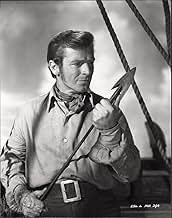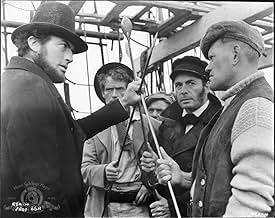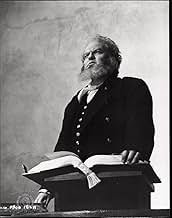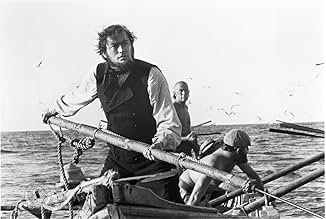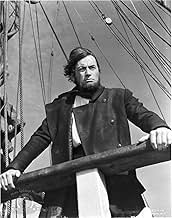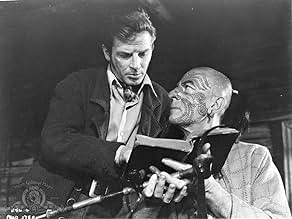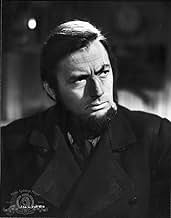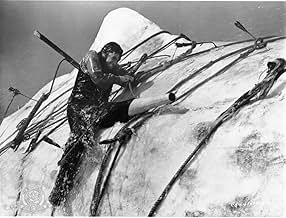AVALIAÇÃO DA IMDb
7,3/10
23 mil
SUA AVALIAÇÃO
O único sobrevivente de um navio perdido conta a história da obsessão autodestrutiva de seu capitão de caçar a baleia-branca, Moby Dick.O único sobrevivente de um navio perdido conta a história da obsessão autodestrutiva de seu capitão de caçar a baleia-branca, Moby Dick.O único sobrevivente de um navio perdido conta a história da obsessão autodestrutiva de seu capitão de caçar a baleia-branca, Moby Dick.
- Direção
- Roteiristas
- Artistas
- Prêmios
- 5 vitórias e 4 indicações no total
Friedrich von Ledebur
- Queequeg
- (as Friedrich Ledebur)
Tamba Allen
- Pip
- (não creditado)
Avaliações em destaque
"We are all killers, on land and on sea," wrote Herman Melville more than 100 years ago. But the artistic failure of a recent television adaptation of his greatest work shows that some are killers, too, on screen. Movie makers. Butchers. Their guts are now gorged with Moby Dick.
"Majestic" raved "TV Guide" about USA Network's production of Melville's book. Reading that review I had a fantasy where Captain Ahab, with his sublime limp, walks into the magazine's office, shoves director John Huston's 1956 film of Moby Dick into the VCR, points to the screen and defiantly exclaims:
"There's majesty for you . . . "
. . . in the faces of men. Huston's film benefits from its intelligent casting of the seamen. The actors in the recent production are just pretty-boy imports from Los Angeles, rabble-rousers lacking the dignity that is gained from a lifetime of duty. But that dignity is plainly visible on the rugged faces of the men in the earlier film. One rarely sees that anymore.
. . . in the faces of women, too. The images of the women suffering as they watch their men go off to sea are utterly devastating, they hold so much emotional depth, so much beauty. The attention to detail in Huston's film is striking: the hairs on the chins of the old women, the tired, thick-skinned expressions of the wives and widows, the heavy shawls covering their heads.
. . . in the performances. Over 40 years ago when Orson Welles gave his performance as Father Mapple (a role which only a person with a special kind of magnificence could successfully take on), Gregory Peck might have been busily preparing for his role as Captain Ahab in the same film. What a testament to Peck's stature as one of our leading actors that throughout his career he could play not only Captain Ahab but also, in the recent production, Father Mapple.
. . . in the color. Huston's film is in Technicolor, a technique which produced colors not even seen in nature. The sky is now blue now red now green. The water is brown, pink, gray. Colors blend. Colors clash. By comparison, how banal the colors of our post-Technicolor world!
. . . in the mouth. The seamen have the exquisite mouths of pipe-smokers. The upper lip tight and stiff after so many hours pulled down in the puff.
. . . in the eyes. My favorite scene is where Peck as Captain Ahab famously proclaims: "Speak not to me of blasphemy. I'd strike the sun if it insulted me." The lighting, the acting, everything here is superb. The camera is focused tightly on Peck's face. The stark appearance of his eyes -- the tense, black irises all surrounded by gleaming white -- seems to reveal the subtext of the story. His eyes electrify!
John Huston's film says more in its two hours than USA Network's says in four; it suggests a lot and explains little, whereas the latter tries to explain a lot but says nothing. A great film, it doesn't butcher Melville's Moby Dick but adds to its power.
"Majestic" raved "TV Guide" about USA Network's production of Melville's book. Reading that review I had a fantasy where Captain Ahab, with his sublime limp, walks into the magazine's office, shoves director John Huston's 1956 film of Moby Dick into the VCR, points to the screen and defiantly exclaims:
"There's majesty for you . . . "
. . . in the faces of men. Huston's film benefits from its intelligent casting of the seamen. The actors in the recent production are just pretty-boy imports from Los Angeles, rabble-rousers lacking the dignity that is gained from a lifetime of duty. But that dignity is plainly visible on the rugged faces of the men in the earlier film. One rarely sees that anymore.
. . . in the faces of women, too. The images of the women suffering as they watch their men go off to sea are utterly devastating, they hold so much emotional depth, so much beauty. The attention to detail in Huston's film is striking: the hairs on the chins of the old women, the tired, thick-skinned expressions of the wives and widows, the heavy shawls covering their heads.
. . . in the performances. Over 40 years ago when Orson Welles gave his performance as Father Mapple (a role which only a person with a special kind of magnificence could successfully take on), Gregory Peck might have been busily preparing for his role as Captain Ahab in the same film. What a testament to Peck's stature as one of our leading actors that throughout his career he could play not only Captain Ahab but also, in the recent production, Father Mapple.
. . . in the color. Huston's film is in Technicolor, a technique which produced colors not even seen in nature. The sky is now blue now red now green. The water is brown, pink, gray. Colors blend. Colors clash. By comparison, how banal the colors of our post-Technicolor world!
. . . in the mouth. The seamen have the exquisite mouths of pipe-smokers. The upper lip tight and stiff after so many hours pulled down in the puff.
. . . in the eyes. My favorite scene is where Peck as Captain Ahab famously proclaims: "Speak not to me of blasphemy. I'd strike the sun if it insulted me." The lighting, the acting, everything here is superb. The camera is focused tightly on Peck's face. The stark appearance of his eyes -- the tense, black irises all surrounded by gleaming white -- seems to reveal the subtext of the story. His eyes electrify!
John Huston's film says more in its two hours than USA Network's says in four; it suggests a lot and explains little, whereas the latter tries to explain a lot but says nothing. A great film, it doesn't butcher Melville's Moby Dick but adds to its power.
This oceans saga features the sole survivor of a lost whaling ship who relates the tale of a white whale and the captain Ahab's obsession with desires for vendetta upon the greatest animal . It starts in New Bedford , Massachussets, where arrives a novice named Ishmael (Richard Basehart) who signs aboard the whaling ship Pequod and befriends a Polynesian native , harpooner Queequeg (Friedrich Ledebur) . He meets captain Ahab (Gregory Peck) who has a self-destructive obsession to hunt the white whale , Moby Dick . Ahab consecrates his life to hunt it full of hating and vengeance . Soon enough Ishmael aware about the great white whale who claimed the captain's leg and Ahab's determination to seek avenge on the beast that crippled and scarred him , no matter what the cost to himself , his crew or ship .
This impressive adaptation based on Herman Melville's 1851 classic novel is vividly brought to screen . Suspense and tension of the ocean is completely captured , including enduring images as the storm with the 'fire of Saint Telmo' . Climatic final battle is an overwhelming piece of cinema as you are likely to watch . Huston, along with prestigious Sci-Fi author Ray Bradbury wrote a screenplay that was faithful to the novel , stamping this movie with epic images and thought-provoking dialogs . In his memories , Huston wrote that it was his most difficult and enduring film . Huston decided to do the opening sequences at a small village called Youghal located on Irland coast and the maritime scenes were filmed in Islas Canarias , Spain . The FX experts created a great whale made with gum and plastic and moved by means of remote control . Huston bought to Walt Disney the ship used in 'Treasure Island' (by Byron Haskin) and was modified as Herman Melville described the Pequod . Top-notch main cast who realizes extraordinary performances . Peck is fabulous , though Huston had wanted to make the movie 20 years earlier and star his daddy Walter Huston . Phenomenal support cast as Bernard Miles as Manxman , James Robertson Justice as captain Boomer , Harry Andrews as Stubbs , and Leo Genn who steals the show as officer Starbuck . Cameraman Oswald Morris's breathtaking color cinematography splendidly conveys the bleaker qualities of the chase . Exciting and rousing musical score by Philip Stainton and well conducted by the usual Louis Levy . Rating : Above average , quite a few moments that click make this top-of-the-range movie more than watchable . It results to be one of the most thrilling and moving see sagas ever realized .
It's remade in 1998 TV series by Franc Roddan with Patrick Stewart ,Henry Thomas , Bill Hunter and Gregory Peck who takes on the character of Jonah-and-the-whale sermonizing Father Mapple who in this classic adaptation was vividly played by Orson Welles . Furthermore recent lousy rendition full of computer generator FX starred by Barry Bostwick and Renee O'Connor .
This impressive adaptation based on Herman Melville's 1851 classic novel is vividly brought to screen . Suspense and tension of the ocean is completely captured , including enduring images as the storm with the 'fire of Saint Telmo' . Climatic final battle is an overwhelming piece of cinema as you are likely to watch . Huston, along with prestigious Sci-Fi author Ray Bradbury wrote a screenplay that was faithful to the novel , stamping this movie with epic images and thought-provoking dialogs . In his memories , Huston wrote that it was his most difficult and enduring film . Huston decided to do the opening sequences at a small village called Youghal located on Irland coast and the maritime scenes were filmed in Islas Canarias , Spain . The FX experts created a great whale made with gum and plastic and moved by means of remote control . Huston bought to Walt Disney the ship used in 'Treasure Island' (by Byron Haskin) and was modified as Herman Melville described the Pequod . Top-notch main cast who realizes extraordinary performances . Peck is fabulous , though Huston had wanted to make the movie 20 years earlier and star his daddy Walter Huston . Phenomenal support cast as Bernard Miles as Manxman , James Robertson Justice as captain Boomer , Harry Andrews as Stubbs , and Leo Genn who steals the show as officer Starbuck . Cameraman Oswald Morris's breathtaking color cinematography splendidly conveys the bleaker qualities of the chase . Exciting and rousing musical score by Philip Stainton and well conducted by the usual Louis Levy . Rating : Above average , quite a few moments that click make this top-of-the-range movie more than watchable . It results to be one of the most thrilling and moving see sagas ever realized .
It's remade in 1998 TV series by Franc Roddan with Patrick Stewart ,Henry Thomas , Bill Hunter and Gregory Peck who takes on the character of Jonah-and-the-whale sermonizing Father Mapple who in this classic adaptation was vividly played by Orson Welles . Furthermore recent lousy rendition full of computer generator FX starred by Barry Bostwick and Renee O'Connor .
For those folks that want great literature without having to read a 500-page tome, then this Readers Digest like condensation might be the ticket. All the high points of Moby Dick are touched on starting with 'Call me Ishmael," and so on.
As all have already pointed out, Gregory Peck has nailed the Ahab character. You got me how he managed the whalebone peg leg. The obsessive rush to take vengeance on the great whale boils in crazed Ahab's head and certainly his crew one by one catch the fever for either greed or blind allegiance. Therefore, our allegorical story full of biblical references mete out large portions of philosophical sophisms, enough for the entire Humanities Departments at fifty Universities to burn the midnight whale oil; oh, the reams of paper written about poor Moby, we're talking deforestation here.
If ever there was a story to get young men to read Lit, Moby Dick is the one.
As all have already pointed out, Gregory Peck has nailed the Ahab character. You got me how he managed the whalebone peg leg. The obsessive rush to take vengeance on the great whale boils in crazed Ahab's head and certainly his crew one by one catch the fever for either greed or blind allegiance. Therefore, our allegorical story full of biblical references mete out large portions of philosophical sophisms, enough for the entire Humanities Departments at fifty Universities to burn the midnight whale oil; oh, the reams of paper written about poor Moby, we're talking deforestation here.
If ever there was a story to get young men to read Lit, Moby Dick is the one.
This is a film that becomes part of you. I used to watch it over and over again on TV when it was shown during my childhood in the 1960's, and I never tire of watching it. And whenever I find myself living somewhere away from the ocean, the longing is intense to find water again. "Call me Ishmael".
The screenplay was written by Ray Bradbury, and it was his first. In his lectures and interviews, Bradbury always seems to tell the story of how John Huston contacted him out of the blue for this assignment. Evidently, he flew Bradbury and his wife to Ireland, where the science fiction writer was holed up in a hotel for a few weeks, in a wonderful agony of creation.
Bradbury has always been enamoured with classic novels. His book "Fahrenheit 451" told us how great literature somehow becomes subversive, in a controlled society. Under fascism, individuals are not encouraged to understand what it is to be truly human. Life becomes flat, and it is a deliberate process.
Before I had a VCR, I taped this movie on an audio cassette. It was an amazing experience to see it unfold in my mind's eye.
Bradbury put his whole heart into this screenplay, and the result can never be matched.
The screenplay was written by Ray Bradbury, and it was his first. In his lectures and interviews, Bradbury always seems to tell the story of how John Huston contacted him out of the blue for this assignment. Evidently, he flew Bradbury and his wife to Ireland, where the science fiction writer was holed up in a hotel for a few weeks, in a wonderful agony of creation.
Bradbury has always been enamoured with classic novels. His book "Fahrenheit 451" told us how great literature somehow becomes subversive, in a controlled society. Under fascism, individuals are not encouraged to understand what it is to be truly human. Life becomes flat, and it is a deliberate process.
Before I had a VCR, I taped this movie on an audio cassette. It was an amazing experience to see it unfold in my mind's eye.
Bradbury put his whole heart into this screenplay, and the result can never be matched.
When John Huston was casting for Moby Dick he got to make it on condition that he get a name actor to play Ahab. He went to Gregory Peck who was surprised by the offer. Given his image and the roles he had played up to that time, Peck thought he'd be better cast as Starbuck the first mate. Nevertheless he agreed to do Ahab.
Peck got mixed reviews at the time, but over the course of 50 years his performance has gotten better with time. The film itself which was shot in Ireland and Wales has also aged well. It's a nice depiction of life on a whaling ship in the 1840s and the crew of the Pequod are nicely cast in their roles.
Orson Welles was set to do his own adaption of Moby Dick and canceled his film when he heard his friend John Huston was doing Moby Dick. Welles asked about doing Ahab, but was given the small role of Father Mapple, the minister who blesses the Pequod's voyage. In fact Huston gave Welles a free hand to do the scene as he saw fit and the results are gratifying.
Of course Herman Melville's novel is about obsession and vengeance. I've always thought the point of Moby Dick is that the evil white whale who Ahab so personalizes and demonizes is just a whale doing his whale thing trying to stay alive. It is in fact the whalers who hunt him and his kind. And Ahab losing his leg is what we would call an occupational accident. The evil is how Ahab seduces the whole crew into his own madness, even first mate Starbuck, played winningly by Leo Genn who is the voice of reason and civilization.
Other cast members to note are Harry Andrews as second mate Stub, Friedrich Ledebuhr as Queequeg the Pacific Islander harpooner, and of course Richard Basehart as Ishmael who tells the tale.
Peck got mixed reviews at the time, but over the course of 50 years his performance has gotten better with time. The film itself which was shot in Ireland and Wales has also aged well. It's a nice depiction of life on a whaling ship in the 1840s and the crew of the Pequod are nicely cast in their roles.
Orson Welles was set to do his own adaption of Moby Dick and canceled his film when he heard his friend John Huston was doing Moby Dick. Welles asked about doing Ahab, but was given the small role of Father Mapple, the minister who blesses the Pequod's voyage. In fact Huston gave Welles a free hand to do the scene as he saw fit and the results are gratifying.
Of course Herman Melville's novel is about obsession and vengeance. I've always thought the point of Moby Dick is that the evil white whale who Ahab so personalizes and demonizes is just a whale doing his whale thing trying to stay alive. It is in fact the whalers who hunt him and his kind. And Ahab losing his leg is what we would call an occupational accident. The evil is how Ahab seduces the whole crew into his own madness, even first mate Starbuck, played winningly by Leo Genn who is the voice of reason and civilization.
Other cast members to note are Harry Andrews as second mate Stub, Friedrich Ledebuhr as Queequeg the Pacific Islander harpooner, and of course Richard Basehart as Ishmael who tells the tale.
Você sabia?
- CuriosidadesGregory Peck initially blamed the poor reviews of his performance on the script, which he felt contained "too much prose from the novel". However, he later acknowledged that he had been too young for the part at 38, since Captain Ahab was supposed to be an old man at the end of his career (Ahab's age, as implied in the book's chapter "The Symphony", is 58). He added, "The film required more. At the time, I didn't have more in me." and apologized to the screenwriters. Director John Huston admitted he didn't want Peck as Ahab, but had spoken very highly of him & was very satisfied with his performance.
- Erros de gravaçãoThe way the ship was moved away from the pier was incorrect. The crew is shown hauling a line from the pier. This would not make the ship move forward. To move a ship out of the harbor, it is therefore, necessary to provide something to pull against. A special anchor, called a kedging anchor, is carried as far from the ship as possible by the longboat and then dropped to the seabed. The remaining crew pull the ship out to it winding the line around the capstan or winch, and then it is hauled up and the process repeated as many times as necessary.
- Citações
Captain Ahab: From hell's heart I stab at thee; for hate's sake I spit my last breath at thee. Ye damned whale.
- Cenas durante ou pós-créditosThe film finishes with 'Finis' instead of the usual 'The End'.
- ConexõesEdited into De 7 Dødssyndene: Latskap (2007)
Principais escolhas
Faça login para avaliar e ver a lista de recomendações personalizadas
Detalhes
- Data de lançamento
- País de origem
- Idioma
- Também conhecido como
- Herman Melville's Moby Dick
- Locações de filme
- Youghal, County Cork, Irlanda(harbour: New Bedford - departure of The Pequod)
- Empresa de produção
- Consulte mais créditos da empresa na IMDbPro
Bilheteria
- Orçamento
- US$ 4.500.000 (estimativa)
- Faturamento bruto mundial
- US$ 353
- Tempo de duração1 hora 56 minutos
- Proporção
- 1.66 : 1
Contribua para esta página
Sugerir uma alteração ou adicionar conteúdo ausente



